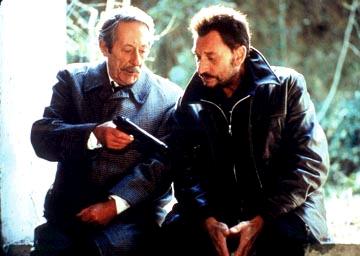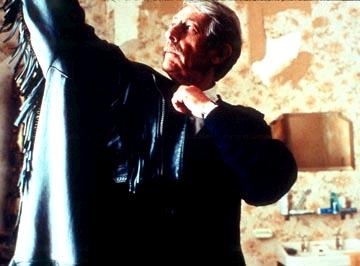The Man on the Train
(L'Homme du Train)


Very little happens in The Man on the Train, which makes it all the more fascinating because Patrice Leconte's film is so engaging. The film amounts to an extended conversation between two men, Manesquier (Jean Rochefort, Lost in La Mancha, The Closet) and Milan (Johnny Hallyday, Love Me, Why Not Me?), who are on opposite ends of just about every spectrum conceivable. Manesquier is a retired teacher who still tutors students in poetry. He lives by himself in a large house, never locking the gate or the doors (hey, it's a small town). Manesquier has a very lonely life. Every day he follows a particular schedule, and it's obvious that he is looking for something else to do. He is scheduled for an operation on Saturday.
This something else comes in the form on Milan. Milan is in town to rob the bank Saturday. In the meantime, Manesquier volunteered his house for a temporary shelter. Milan, with his imposing figure, guns, and leather jacket, fascinates Manesquier. Much to Milan's initial annoyance, Manesquier seems like one of those irksome children that will not stop asking questions. Manesquier does not know that Milan is in town to rob the bank, but suspects something. Leconte (The Girl on the Bridge, The Widow of Saint-Pierre) made excellent choices in choosing his leading men, because the two seemingly embody their characters. Rochefort does look and act like the kindly professor, and singer Hallyday, with is grizzled features and terseness, does cut an imposing figure.
Claude Kotz's (Felix and Lola, The Hairdresser's Husband) is full of wry humor and philosophical observations. As Milan and Manesquier get to know each other better, each realizes that they envy the other. Milan longs for the comfort and regularity of Manesquier's life, and Manesquier wants the adventure and danger missing from his. Both are at a point where they are rethinking what is important in life. Manesquier is facing his mortality with his operation, while planning for the bank robbery is not going as planned for Milan. Each views the other wistfully, although Manesquier is clearly infatuated with Milan. It's a role reversal of sorts; usually the younger person reveres the elder. Leconte and Kotz have so much dialogue in the film that viewers have an excellent sense of who each person is and how he thinks. The Man on the Train kind of meanders along, and has an ending that may be a little too artsy for some, but it is still enjoyable.